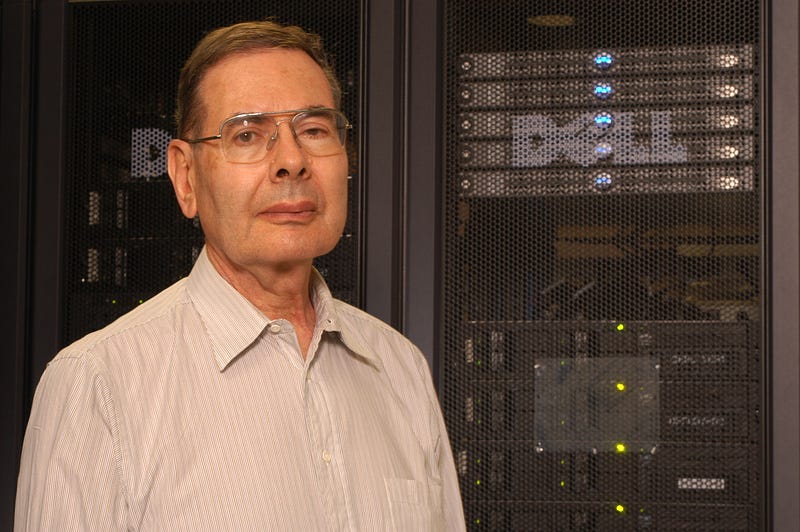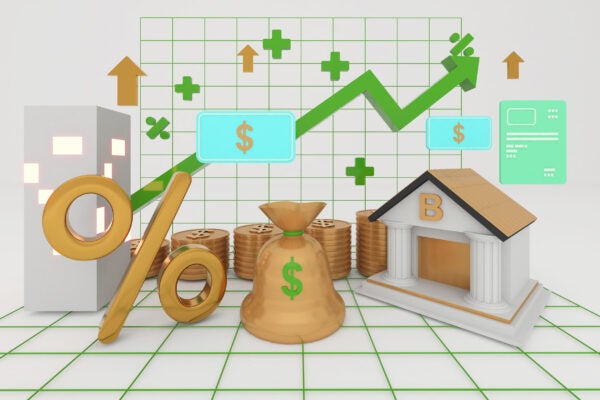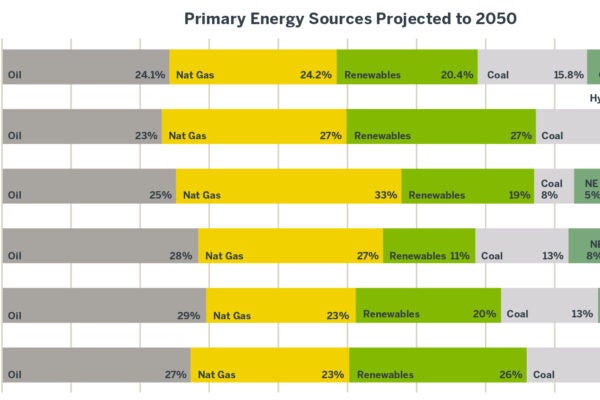Facing the Future
After decades studying technology, a researcher predicts what’s next in AI, bitcoin, and the post-pandemic workplace

The future has been an ongoing presence in Andrew Whinston’s life.
Questions about life in the future — and the problems that would need to be solved — have long fascinated Whinston, a Texas McCombs professor of information, risk, and operations management. They even prompted him to switch from the economics master’s program at Princeton University to Carnegie Mellon University during the 1960s. He wanted access to new thinking about artificial intelligence.
“It seemed like an interesting future topic, and I felt like I should be in on something that other people were not involved in,” says Whinston. “Princeton economics looked like Yale economics, but Carnegie and a small group at MIT were looking at AI.”
So, it’s not surprising that Whinston’s research at McCombs — where he is the Hugh Roy Cullen Centennial Chair in Business Administration and director of the Center for Research in Electronic Commerce — is often tech-focused. He’s studied topics as diverse as artificial intelligence, digital currencies, and ransomware.
“I try to keep up with the times,” says Whinston.
In a recent interview, Whinston referenced his research and shared his thoughts about tech trends.
After studying technology for decades, do you see it as inherently good or bad?
We like to control things so that they’re a force for good, but that isn’t the way the world works. Computers are great, but computers also are dangerous because of pervasive security problems. We may soon have major cybersecurity attacks on our infrastructure, and ransomware is an ongoing problem.
Does AI give you heartburn?
You can use AI in lots of constructive ways. We published a paper on how to process advertisements and showed that ads would be more popular if they had certain properties, like consistency between the text and pictures. We also had a student who just defended her thesis by using AI to reduce food waste in supermarkets when there’s still a certain amount of time left to sell perishable fruits and vegetables. She was looking at how companies would profit and how consumers could benefit by paying less. That’s a force for good.
But there are also concerns about AI being intrusive. You have vision systems all over China watching what people are doing.
AI may be doing more, but there are still jobs for humans. With the pandemic accelerating workplace changes, what questions should we be asking?
Should companies allow high-tech workers to continue working remotely and look at tools to incentivize them? Real estate also becomes a huge issue. How does that shake out? You might have the original building owners go bankrupt. Then the banks will take a hit, and they’ll have to put the office up for sale at a lower price.
But we’ve also reduced pollution by not driving as much, and some companies have satellite for internet connection so you can go to a rural area and get a great connection. When you have experts in computing spread around the country, then doctors will be more willing to move to those places, and other professionals will say, “Why don’t we go there, too?” The country may smooth out and have a smaller number of highly concentrated places with a lot of traffic congestion and pollution.
You’ve also looked at cryptocurrencies. What do you expect for our payment systems?
We’re using less cash, and credit cards are a system where you lose privacy. It is possible that many people know what you’re doing, and they’re basically getting your valuable private information. China is issuing a digital currency, but the U.S. Federal Reserve still wants to study that approach. Meanwhile, Facebook wants to have its own digital currency because it’s selling things to people in lots of countries that use currencies Facebook isn’t interested in having.
Bitcoin’s price is impacted by many things, including pure speculation but also the need to pay bitcoin for ransomware. That’s another problem and it’s not going away. In the future we will have to teach cryptography to kids in grade school because digital currency transactions require an understanding of cryptography. Digital currencies give you privacy — you can buy things and nobody knows who you are. That’s appealing to criminals, too.
Are there any dangers with bitcoin?
Pollution is a problem. With the current version of the blockchain, you have to guess a random number to win bitcoins. So, you now have mining pools in which miners get together and build powerful computing systems to try and discover that random number. That requires enormous electricity and is contributing to pollution, currently equal to the pollution generated by Denmark. If the bitcoin price continues rising, the pollution level may exceed one of the major countries. It is clear that some actions are necessary to avoid this problem. For example, creating a new digital currency without damaging the environment.

Looking out over the next five years, where do you see the biggest tech advances?
Robotics and vision systems will be improved by introducing 5G. AI systems will become more efficient. Consider autonomous vehicles: You may have toll roads, and the autonomous vehicles will have to have enough intelligence to decide whether to use digital money to go on a toll road.
Would you ride in one?
Probably, it will be so common you’ll just take it for granted. Uber and Lyft will be, in some sense, radically different companies because they won’t deal with drivers. They’ll possibly be using electric autonomous vehicles.
You have studied bundle pricing, which you say makes streaming services like Netflix profitable. What’s next in streaming?
There are now streaming classes that charge $40 for a class, and the companies are making their money by having massive audiences. It could be that education becomes a big commercial enterprise where people in other parts of the world get a tremendous education at prices that are minimal. And it’s convenient. I talked with a former student who is a venture capitalist, and he said he’s putting his money in two areas: education and internet security. Of course, they go together because education means computer-based education, and it’s the ability to control and manage the internet that’s important for security.
Story by Mary Ann Roser
About this Post
Share:


